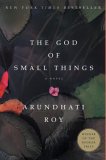Summary | Excerpt | Reading Guide | Reviews | Readalikes | Genres & Themes | Author Bio

Inspector Thomas Mathew's mustaches bustled like the friendly Air India Maharajah's, but his eyes were sly and greedy.
"It's a little too late for all this, don't you chink?" he said. He spoke the coarse Kottayam dialect of Malayalam. He stared at Ammu's breasts as he spoke. He said the police knew all they needed to know and that the Kottayam Police didn't take statements from veshyas or their illegitimate children. Ammu said she'd see about that. Inspector Thomas Mathew came around his desk and approached Ammu with his baton.
"If I were you," he said, "I'd go home quietly." Then he tapped her breasts with his baton. Gently. Tap tap. As though he was choosing mangoes from a basket. Pointing out the ones that he wanted packed and delivered. Inspector Thomas Mathew seemed to know whom he could pick on and whom he couldn't. Policemen have that instinct.
Behind him a red and blue board said:
Politeness.
Obedience.
Loyalty.
Intelligence.
Courtesy.
Efficiency.
When they left the police station Ammu was crying, so Estha and Rahel didn't ask her what veshya meant. Or, for that matter, illegitimate. It was the first time they'd seen their mother cry. She wasn't sobbing. Her face was set like stone, but the tears welled up in her eyes and ran down her rigid cheeks. It made the twins sick with fear. Ammu's tears made everything that had so far seemed unreal, real. They went back to Ayemenem by bus. The conductor, a narrow man in khaki, slid towards them on the bus rails. He balanced his bony hips against the back of a seat and clicked his ticket-puncher at Ammu. Where to? the click was meant to mean. Rahel could smell the sheaf of bus tickets and the sourness of the steel bus rails on the conductor's hands.
"He's dead," Ammu whispered to him. "I've killed him."
"Ayemenem," Estha said quickly, before the conductor lost his temper.
He took the money out of Ammu's purse. The conductor gave him the tickets. Estha folded them carefully and put them in his pocket. Then he put his little arms around his rigid, weeping mother.
Two weeks later, Estha was Returned. Ammu was made to send him back to their father, who had by then resigned his lonely tea-estate job in Assam and moved to Calcutta to work for a company that made carbon black. He had remarried, stopped drinking (more or less) and suffered only occasional relapses.
Estha and Rahel hadn't seen each other since.
And now, twenty-three years later, their father had re-Returned Estha. He had sent him back to Ayemenem with a suitcase and a letter. The suitcase was full of smart new clothes. Baby Kochamma showed Rahel the letter. It was written in a slanting, feminine, convent-school hand, but the signature underneath was their father's. Or at least the name was. Rahel wouldn't have recognized the signature. The letter said that he, their father, had retired from his carbon-black job and was emigrating to Australia, where he had got a job as Chief of Security at a ceramics factory, and that he couldn't take Estha with him. He wished everybody in Ayemenem the very best and said that he would look in on Estha if he ever came back to India, which, he went on to say, was a bit unlikely.
Baby Kochamma told Rahel that she could keep the letter if she wanted to. Rahel put it back into its envelope. The paper had grown soft, and folded like cloth.
She had forgotten just how damp the monsoon air in Ayemenem could be. Swollen cupboards creaked. Locked windows burst open. Books got soft and wavy between their covers. Strange insects appeared like ideas in the evenings and burned themselves on Baby Kochamma's dim forty-watt bulbs. In the daytime their crisp, incinerated corpses littered the floor and windowsills, and until Kochu Maria swept them away in her plastic dustpan, the air smelled of Something Burning.
1997 Arundhati Roy All Rights Reserved.
Your guide toexceptional books
BookBrowse seeks out and recommends the best in contemporary fiction and nonfiction—books that not only engage and entertain but also deepen our understanding of ourselves and the world around us.